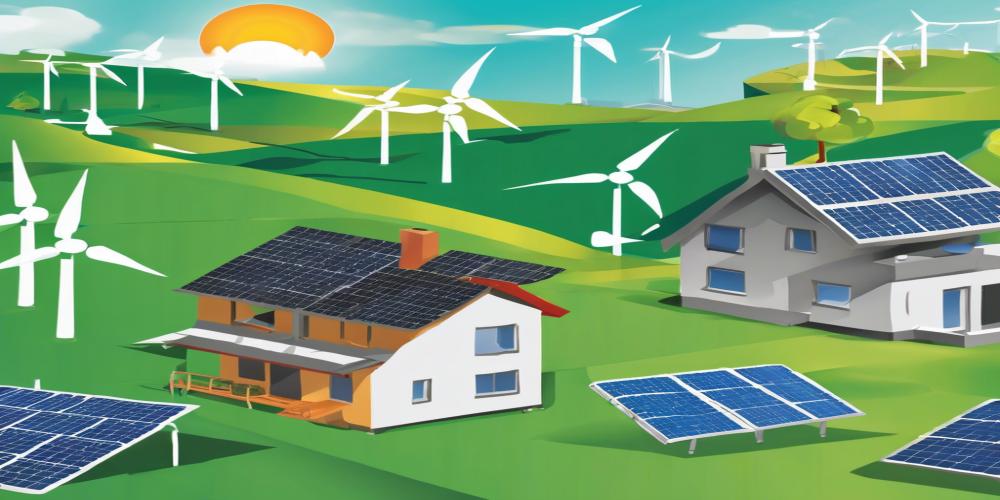Understanding Renewable Energy Options for Homeowners
Introduction
As concerns about climate change and environmental sustainability grow, more homeowners are turning to renewable energy options to power their homes. Renewable energy not only reduces carbon footprints but can also lead to significant savings on energy bills. This blog post aims to provide an in-depth understanding of various renewable energy options available for homeowners, their benefits, costs, and how you can make an informed decision about which option might be best for your home.
Why Consider Renewable Energy?
Renewable energy comes from natural sources that are replenished at a rate faster than they are consumed. The most common renewable energy options for homeowners include solar power, wind energy, geothermal energy, and biomass. Here are a few compelling reasons to consider renewable energy for your home:
- Environmental Benefits: Renewable energy sources produce little to no greenhouse gases or polluting emissions, helping to combat climate change and reduce air pollution.
- Energy Independence: Generating your own renewable energy can reduce your reliance on the grid and protect you from volatile energy prices.
- Financial Savings: While the initial investment can be significant, renewable energy systems can lead to long-term savings on electricity bills.
- Government Incentives: Many governments offer tax credits, rebates, and other incentives to encourage the adoption of renewable energy.
Popular Renewable Energy Options for Homeowners
Solar Energy
Solar energy harnesses the sun's power through photovoltaic (PV) panels or solar thermal systems. PV panels convert sunlight directly into electricity, while solar thermal systems use sunlight to heat water or air for home use.
Benefits:
- Abundant Resource: If your home receives ample sunlight, solar energy can be a highly efficient source of power.
- Scalability: You can install solar panels incrementally based on your budget and energy needs.
- Low Maintenance: Solar PV systems generally require minimal maintenance once installed.
Drawbacks:
- Initial Cost: The upfront cost can be high, though it has been decreasing in recent years.
- Weather Dependence: Solar energy production can be affected by weather conditions and the time of year.
Wind Energy
Wind energy uses wind turbines to capture kinetic energy from the wind and convert it into electricity. Small wind turbines can be installed on a property if conditions are suitable—generally, an average wind speed of at least 10 miles per hour is recommended.
Benefits:
- High Efficiency: If located in a windy area, a wind turbine can produce a significant amount of electricity.
- Complementary to Solar: Wind energy can complement solar systems, providing energy when there is no sunlight.
Drawbacks:
- Space Requirements: Wind turbines need adequate space and a location free from obstructions like trees or buildings.
- Noise and Aesthetics: Some people find wind turbines noisy and visually unappealing.
Geothermal Energy
Geothermal energy uses the earth's stable underground temperature to provide heating and cooling for your home through a geothermal heat pump system. This system transfers heat between your home and the ground or a body of water nearby.
Benefits:
- High Efficiency: Geothermal systems are among the most efficient types of heating and cooling systems available.
- Long Lifespan: Geothermal heat pump systems often last longer than conventional HVAC systems.
- Constant Availability: Unlike solar and wind, geothermal energy is available 24/7 regardless of weather conditions.
Drawbacks:
- High Initial Cost: The installation can be expensive due to the need for ground excavation or drilling.
- Site Specific: The efficiency can depend on your property’s geology and access to a sufficient body of water if a water-source system is used.
Biomass Energy
Biomass energy uses organic materials such as wood, agricultural waste, or even animal manure to produce electricity or heat through combustion. Biomass can be used in stoves or boilers designed to burn organic materials efficiently.
Benefits:
- Carbon Neutral: The carbon dioxide released during combustion is roughly equal to the amount absorbed by the plants during their growth.
- Waste Utilization: Biomass energy can make use of agricultural or industrial waste materials that might otherwise be discarded.
Drawbacks:
- Emission Concerns: While generally considered carbon-neutral, biomass combustion can still release pollutants such as particulates and carbon monoxide.
- Storage and Supply: Biomass needs storage space and a steady supply of material.
How to Choose the Right Renewable Energy Option for Your Home
Selecting the best renewable energy option for your home depends on several factors:
- Location: Your geographical location affects what renewable energy sources are most viable. Sunny areas benefit from solar energy, while windy regions are ideal for wind turbines. Geothermal energy requires specific geological characteristics.
- Budget: Evaluate your financial situation and consider available government incentives. Solar and geothermal typically require a larger upfront investment compared to biomass systems.
- Energy Needs: Assess your household's energy consumption. A home with high energy needs might require a combination of renewable energy sources.
- Local Regulations and Zoning Laws: Some localities have specific regulations about the installation of renewable energy systems. Ensure compliance before making a decision.
Government Incentives and Rebates
In many regions, governments offer incentives to make renewable energy more affordable for homeowners. These incentives might include federal tax credits, state rebates, low-interest loans, and net metering programs where you can sell excess energy back to the grid. It’s important to stay informed about available incentives which can significantly offset the initial costs of installing a renewable energy system.
Conclusion
Adopting renewable energy can bring numerous benefits, from reducing your carbon footprint to potentially lowering your energy bills. By understanding the unique advantages and challenges of solar, wind, geothermal, and biomass energy, you can make an educated decision on what suits your home best. Investing in renewable energy is not just a step towards a more sustainable future, but also a way to gain energy independence and stabilize your household finances in the long term. If you're interested in exploring renewable energy options for your home, start by consulting with a local renewable energy expert or conducting a home energy audit to determine the best course of action.
Contact Us:
For more information about renewable energy options for your home, feel free to contact us at [Your Contact Information]. Our team of experts is here to help you make a smooth transition to renewable energy and provide you with tailored solutions based on your specific needs and location.
Keywords:
Renewable energy, solar energy, wind energy, geothermal energy, biomass energy, home energy, energy savings, government incentives, sustainable living.










